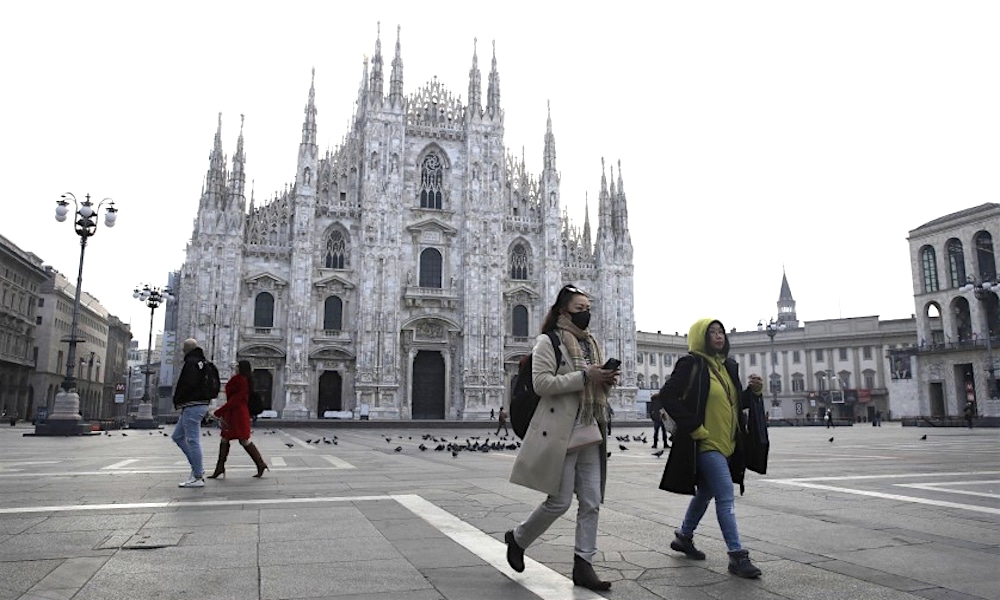
Asia Pacific destinations popular with travellers from mainland China continue to report a huge hotel occupancy impact from the coronavirus outbreak, the Department of Foreign Affairs has updated its travel advice for Italy, while the WTTC has said that closing borders, blanket travel bans and more extreme government policies will not stop the spread of the coronavirus.
The death toll from the coronavirus has now risen to 2,707 in China and 42 elsewhere, including 15 in Iran, 11 in South Korea, and seven in Italy. Reported cases have reached 77,663 in mainland China and 2,679 in 37 other countries, plus the Diamond Princess. A total of 27,836 people have now recovered from the virus.
DFA Advice
The Department of Foreign Affairs has updated its travel advice for Italy as follows: “There has been an increase in the number of confirmed cases of coronavirus in Italy. As a result of this, the Italian government has placed travel restrictions on the towns of Codogno, Castiglione d’Adda, Casalpusterlengo, Fombio, Maleo, Somaglia, Bertonico, Terranova dei Passerini, Castelgerundo and San Fiorano. For the moment, therefore, we are advising citizens not to travel to these towns.
“You are advised to monitor developments regularly. Further information (including in English) is available at www.salute.gov.it/nuovocoronavirus.
“The regions of Lombardy, Veneto, Friuli Venezia Giulia, Piemonte and Emilia Romagna have put certain restrictions in place, including in relation to events, and the temporary closure of educational and cultural institutions.”
WTTC Warning
Closing borders, blanket travel bans and more extreme government policies will not stop the spread of coronavirus, the head of the World Travel & Tourism Council has argued. WTTC President Gloria Guevara is the former tourism minister of Mexico and has first-hand experience of containing a major, viral incident after dealing with the H1N1 influenza virus in the country.
She has called for governments and authorities worldwide not to overreact with disproportionate measures in a bid to control Covid-19: “Governments and those in authority must not seek to choke travel and trade at this time. Closing borders, imposing blanket travel bans and implementing extreme policies are not the answer to stopping the spread of coronavirus. Past experience shows that taking such extreme action has been ineffective at best. We urge governments to explore fact-based measures which do not affect the vast majority of people and businesses for whom travel is essential.”
Asia Pacific Hotels
Asia Pacific destinations popular with travellers from mainland China continue to report a huge hotel occupancy impact from the coronavirus outbreak, according to preliminary February data from STR. Pulling from Tourism Economics’ global top 20 for mainland China outbound travel, STR analysed 14 markets for a six-week period beginning with 6 January and ending with 16 February.
“With so much dependence on Chinese arrivals, it was anticipated that key markets around the region would see a negative impact from the coronavirus outbreak,” said Jesper Palmqvist, STR Area Director for the Asia Pacific region. “In certain markets, we saw an almost immediate decline in occupancy levels in the early days of February.
“Already a low business travel period due to the Chinese New Year holiday, drops in occupancy were worsened in the wake of the World Health Organisation’s announcement of a global health emergency on 30 January. The impact will likely continue until containment is reported and recovery begins.”
When comparing the first week of the analysis with the last, Macau saw the steepest occupancy decline (down 97%), falling from absolute level of 96% to just 3% in a matter of six weeks. Jesper Palmqvist noted that the 15-day shutdown of casinos in the market was a key reason behind the significant drop.
Hong Kong (down 64% to 25%), already suffering from a political crisis, and Taiwan (down 59% to 26%) were next on the list of decreases.




